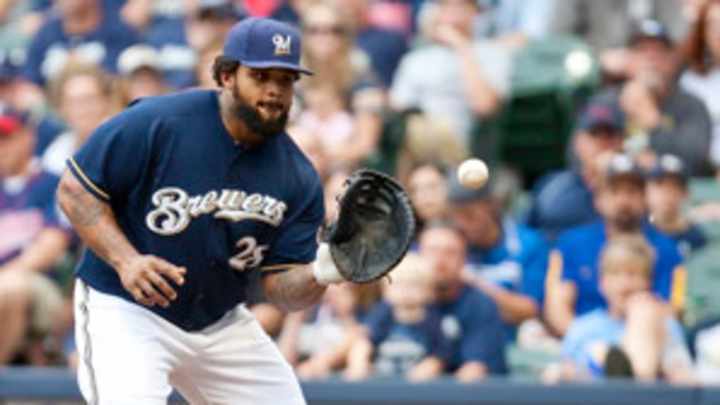Milwaukee would love its new slogan to be: Fear the Brewers

You weren't aware of that either, nor anything else about Milwaukee, beyond the beer and the peripheral existence of a baseball team, called the Brewers, who wear a sprig of barley on their caps and play at Miller Park, none of which discourages the notion of Milwaukee as the Beer City. There are worse things than beer to be known for, but it was -- according to the ancient Schlitz slogan -- "The Beer that Made Milwaukee Famous," not the other way around. And the ale is still wagging the dog.
That's why I'd like to see the red-hot Brewers continue to win, and draw national attention to Milwaukee, a city that has seldom seen the national stage -- though there was that time Springfield was named the fattest city in America and Homer Simpson celebrated by shouting, "In your face, Milwaukee!"
Milwaukeeans, who aren't particularly fat, weren't bothered by the scurrilous reference to their collective circumference. Milwaukeeans aren't especially bothered by anything, even though their city's skyline -- dominated by the 42-story US Bank Center -- appears, when viewed from Lake Michigan, to be giving the whole of the Eastern Seaboard the finger.
Which Milwaukee would have every right to do to the oblivious East Coast, except that the city is largely ego-free. It's comfortable in its own sausage casing. The Green Bay Packers played many of their home games in Milwaukee from 1933 to 1994 without ever taking the city's name or even hyphenating. In 1995, the Packers returned to monogamy in Green Bay, ending what amounted to a 62-year booty call in the Beer City. As a result, Green Bay remains renowned for its redundant frozen tundra, while Milwaukee makes do as a mecca of frozen custard.
Milwaukee still roots for the Packers, wishing them nothing but the best, because Milwaukee is that kind of city. Chicago, a 90-minute drive to the south, has been called "a pompous Milwaukee," which says more about the latter than the former. If Milwaukee printed its own legal tender, Bob Uecker, the self-deprecating Brewers broadcaster, would be on the one-dollar bill -- beneath whatever the Latin phrase is for "Great Seats, Hey Buddy?"
And yet Milwaukee's humility is not a case of it having much to be humble about. On the contrary: Milwaukee witnessed, in their respective primes, Kareem Abdul-Jabbar and Oscar Robertson, Hank Aaron and Warren Spahn, Robin Yount and Paul Molitor, to say nothing of William Harley and Arthur Davidson, who in 1903 fixed a motor to a bicycle in a wooden shed the size of an outhouse and scrawled the words HARLEY DAVIDSON MOTOR CO. on the door.
And thank goodness they did, or Al McGuire wouldn't have had a Harley to ride around Milwaukee when I was an undergraduate at Marquette. This was a decade after McGuire had coached the Warriors to the 1977 NCAA basketball championship and retired immediately afterward, having hit the ultimate walk-off home run.
"Winning is overrated," McGuire once said. "The only time it's really important is in surgery and war." And while I agree, it would be nice this October if Brewer fans were rewarded with a World Series appearance for the first time in 30 years, for those fans are startlingly legion.
The Milwaukee Braves led the National League in attendance for six straight years from 1953 to 1958 (at which time the Dodgers began to flourish in Los Angeles). The Brewers -- the smallest-market team in baseball -- have drawn three million fans in two of the last three seasons, a figure equal to 53 percent of the population of Wisconsin.
They're not the only team in town, of course. The Milwaukee Bucks have a cute slogan, but few teams really do "Fear the Deer," who had a disappointing 2010-2011 season and now face an NBA lockout. It's been 37 years since that team won a title, Milwaukee's last, and since then the primary Deer to Fear in Milwaukee was Rob Deer, the Brewers slugger and strikeout merchant of the 1980s. In 1987, when I was a junior at Marquette, the Brewers started the season with 13 consecutive wins, one of them a no-hitter by Juan Nieves. After the team's 12th straight victory that April, per a longstanding promise, the George Webb chain of hamburger joints gave away 168,194 burgers in a single day to Brewer fans, many -- if not most of them -- hungry college students.
That 12th straight victory came on Easter Sunday, when the Brewers rallied from a 4-1 deficit in the bottom of the ninth inning, thanks to Deer's game-tying, three-run home run off Rangers reliever Greg Harris. As Deer circled the bases -- right fist raised in the air, golden mullet flouncing in the sun -- the moment was photographed for the cover of that week's Sports Illustrated. Three batters later, the immortal Dale Sveum won the game with another home run, one still spoken of with reverence in Milwaukee.
I thought of all this yesterday, when the Brewers were on another streak, looking to win their eighth consecutive game. They lost, in 11 innings, to St. Louis, Milwaukee's rival in both brewing and baseball. But the Brewers retained a 2 1/2-game lead over the Cardinals, who may yet, come September, have every reason to Fear the Beer.
